
What is one way that you can improve air quality while getting a physical and mental health boost? Biking! The Clean Air Council is committed to advocating for sustainable modes of transportation like accessible and affordable public transit, walking, and biking. In May, we are partnering with Love to Ride, a global organization championing the health and fitness benefits of biking, and Indego Bike Share, Philadelphia’s local bike share program, to bring you the May Bike Month Challenge.
The May Bike Month Challenge is an exciting opportunity to get outside, try something new, or if you are already a seasoned cyclist, go the extra mile! The sign-up is free and easy. Log 5 miles or more over the course of the month, and you are automatically entered into drawings for cash prizes and local gifts like the grand prize, a $4000 vacation or $500 to a restaurant of your choice. While wellness and a chance at prizes are major incentives for hopping on your bike this Spring, you will also be doing your part to help reduce air pollution in Philadelphia. Almost a quarter of total emissions come from transportation. Around 70% of the amount of emissions from passenger vehicles come from trips of 10 miles or less. Last May, Philadelphians biked 43,000 miles and saved 3 tons of carbon emissions from entering the atmosphere. Join us to reduce even more greenhouse gas emissions this year.
Don’t have a bike of your own? Indego Bike Share has you covered. Follow our social media because we will be announcing a promo code before May 1st, offering a 30-day pass to new users for just $5! Take advantage of the over 250 bike stations throughout the city and explore Philadelphia.
Looking for places to go? GoPhillyGo can help. Visit GoPhillyGo to get routes to destinations and events on Philadelphia’s vast trail park system and at nature centers in the Alliance for Watershed Education. Connecting with community and nature is easy using the GoPhillyGo Trip Planner as your guide.
- Take a ride along the river on the Schuylkill River Trail and stop by Fairmount Waterworks to view the falls. Take a break at the Cosmic Café and Cider House or continue riding up scenic Kelly Drive.
- Bike the Wissahickon Trail using the GoPhillyGo Wissahickon Valley Self-Guided Tour.
- Forfeit the rush hour traffic and find Indego bike stations near home and the office, then use the GoPhillyGo Trip Planner to find a route to get some fresh air while commuting to work. Don’t do it alone, become a Workplace Champion, enter your job, and create a team with your coworkers.
Follow Clean Air Council on Facebook, Instagram, and LinkedIn for announcements, progress stats, and prize offerings. Let’s #Ride5 this May for a cleaner and healthier Philadelphia.

Marple Township, Delaware County, PA (February 27, 2025) – Green Amendments For The Generations, Delaware Riverkeeper Network, Citizens for Pennsylvania’s Future, and Clean Air Council, jointly filed an amicus brief in support of intervenors appealing to the Commonwealth Court regarding the Pennsylvania Public Utilities Commission’s (“PUC”) obligation to consider climate change impacts in its environmental reviews pursuant to Article I Section 27 of the Pennsylvania Constitution, otherwise known as the Pennsylvania Green Amendment or the Pennsylvania Environmental Rights Amendment.
The Pennsylvania Green Amendment, first passed in 1971, states that “The people have a right to clean air, pure water, and to the preservation of the natural, scenic, historic and esthetic values of the environment. Pennsylvania’s public natural resources are the common property of all the people, including generations yet to come. As trustee of these resources, the Commonwealth shall conserve and maintain them for the benefit of all the people.” The Amendment was given legal life in 2013 when Delaware Riverkeeper Network, Maya van Rossum – the Delaware Riverkeeper, multiple municipalities, two municipal officials, and a physician used it to challenge unconstitutional pro-fracking legislation known as Act 13.
The amicus brief submitted today is the latest development in the ongoing litigation of Township of Marple v. Pennsylvania Public Utility Commission, in which the Township challenged a PUC-granted petition that exempted PECO natural gas infrastructure from local zoning laws. The Township argued that among other things, the PUC erred when it granted the petition because it declined to consider the potential negative environmental impacts on the public health, safety and welfare of the proposed project; and it challenged the PUC’s finding that the proposed facility was reasonably necessary for the convenience or welfare of the public– which was the basis for granting the petition in the first place.
The case was brought before the Pennsylvania Commonwealth Court, which confirmed in 2023 that the PUC, as is the case with other Pennsylvania government bodies, must ensure that its actions and decisions comply with the constitutional mandates included in the Pennsylvania Green Amendment. As a result, the court vacated the petition and sent the matter back to the PUC with instructions that it issue an Amended Decision “which must incorporate the results of a constitutionally sound environmental impact review as to the proposed siting”. Green Amendments For The Generations, Delaware Riverkeeper Network, Citizens for Pennsylvania’s Future, and Clean Air Council previously filed an amicus brief in support of the intervenors, providing guidance to the PUC on how they may conduct such a review.
Since the first amicus was filed, the PUC has essentially declined to evaluate the climate change impacts of the proposed infrastructure, and has claimed that portion of the review to be the responsibility of the legislature and other state agencies. Once again, the intervenors appealed to the Commonwealth Court challenging this omission from the PUC’s environmental review. The amicus brief filed today details why climate change impacts must be considered in a constitutionally adequate environmental review. It also clarifies that the PUC has an independent obligation to evaluate the climate change impacts where no other agency has reviewed them.
“The Commonwealth Court sent a clear message to the PUC and other Commonwealth agency officials that they must independently and substantially consider the Pennsylvania Green Amendment and the environmental impacts of their projects before they can move forward,” said Maya K. van Rossum, Founder of Green Amendments For The Generations and The Green Amendment Movement, and Leader of the Delaware Riverkeeper Network and the Delaware Riverkeeper. “The PUC must follow through on its constitutional obligations to honor the inalienable rights of Pennsylvanians to pure water, clean air, stable climate, and healthy environments.”
“The PUC failed to complete the task the Commonwealth Court set to it–to perform a constitutionally sound environmental review of the whole project, consistent with its obligations as a trustee of our public natural trust,” said Jessica O’Neill, Managing Attorney for Litigation for PennFuture. “With climate change already substantially affecting the Commonwealth, the implications of climate impacts from this project must not be ignored.”
“With the climate degrading every year, blatantly setting aside our constitutional environmental rights is dangerous and shortsighted,” said Alex Bomstein, Clean Air Council Executive Director. “PUC must remember the public part of its name and its mission to ensure utility service that is both reliable and safe.”
Read the full amicus brief here.
Background: Pennsylvania is one of only three states with a Green Amendment, the other two being Montana and New York. The Amendment gives highest constitutional standing to peoples’ inherent rights to clean air, pure water, stable climate, and healthy environments, and creates an obligation on state governments to consider such protections in all decision-making processes.
The Pennsylvania Green Amendment sat dormant for many years until 2013, when Delaware Riverkeeper Network won a watershed legal victory that struck down pro-fracking legislation that violated the environmental rights that are protected to the highest legal degree in the constitution. This victory inspired the nationwide Green Amendment movement, which now has engagement from over half of the country, including proposed amendments in 19 states and another eight states in the organizing stages.
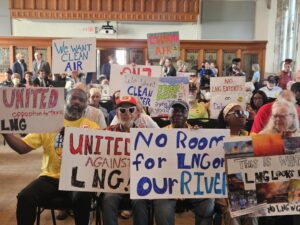
WASHINGTON D.C. (December 17, 2024) – Today, the U.S. Department of Energy (DOE) released its public interest determination analysis, which will provide a framework for evaluating new and pending permits for exporting liquified natural gas (LNG) to countries without a free trade agreement with the United States. This announcement comes nearly a year after President Biden paused permitting decisions for LNG export facilities, which chill fracked gas for storage and transportation to other countries overseas.
The analysis found that continued LNG exports are unsustainable and unadvisable. Notably, the new analysis paints a clear picture of the environmental justice, climate, and economic harms of widespread LNG exports. LNG export terminals are concentrated in communities already burdened by highly-polluting industries, and the buildout of new LNG export facilities will only exacerbate these impacts. LNG exports will also worsen climate change through increasing greenhouse gas emissions from upstream gas production and likely offsetting the development of clean, renewable energy worldwide. Furthermore, unchecked growth of LNG exports will drive up energy costs for residential and commercial consumers while generating profits for the fossil fuel industry. The analysis found flattening international demand for LNG, with most new demand expected to be from China.
Alex Bomstein, Executive Director of Clean Air Council, issued the following statement:
“This report should end the discussion: LNG exports are bad for our pocketbooks, bad for the air we breathe, and bad for the safety of our communities. Energy independence does not mean shipping America’s resources overseas, it means harnessing and storing our abundant solar and wind energy. Clean Air Council urges the DOE to apply the study’s findings and deny the six pending permits for LNG export facilities.”
The findings from this analysis will inform future LNG export authorization decisions by the DOE and hold proposed projects to the strongest-to-date commonsense standards for determining the public impacts of LNG exports. Moreover, the study provides an important factual basis for arguments to deny permits for unlawful LNG export terminal proposals. The new analysis will replace the economic and environmental analyses used by the DOE for application decisions, which were published in 2018 and 2019, respectively.

There are two weeks left of the May Bike Month Challenge and it’s not too late to register! How can a bike challenge help us move towards a more sustainable Philadelphia? Nationally, transportation is responsible for almost a third of greenhouse gas emissions. Replacing just one of your quick drives with a bike ride can have a big impact on reducing pollution and improving air quality, especially if it becomes a habit.
In 2022, The Department of Energy reported that 52% of car trips are for distances under 3 miles and 28% of total trips are to destinations under a mile away. You don’t have to go far to contribute towards cleaner air and a healthier environment for all.
To encourage more cyclists to get out on the road, Clean Air Council partners with Indego, Philly’s bike share program, and Love to Ride, a global biking advocate, to host bike challenges in May and September every year. Participants register, log rides, and are automatically entered into drawings for cash prizes, including this Spring’s grand prize of a $2500 Visa gift card.
Biking is not only a sustainable mode of transportation it also boasts physical and mental health benefits, preventing cardiovascular disease and reducing stress. If you don’t own a bike, Indego has you covered! Philadelphia’s bike-share has over 250 stations throughout the city where you can rent a manual or electric bike and ride to popular events and places. Enjoy 75% off your first month with code INDEPRO24 up until May 31st.
You don’t just have to bike for a work commute. There are several accessible biking trails and exciting places to experience in Philadelphia. GoPhillyGo is a mobile friendly site with destination ideas and biking routes to get you out and having fun while reaping all of the benefits biking has to offer. Here are a few of our favorite trips:
- Take a ride along the river on the Schuylkill River Trail and stop by Fairmount Waterworks to view the falls. Take a break at the Cosmic Café and Ciderhouse or continue riding up scenic Kelly Drive.
- Parks on Tap is in full swing at a different park location every weekend this month. It’s a great way to visit greenspaces throughout the city.
- Want to go a bit further out into nature? Take a ride on the Wissahickon Valley Park Trail.
As a way to incentivize taking just one trip – GoPhillyGo will be giving away a swag bag to one lucky Bike Challenge participant in Philadelphia, and all you have to do is log a single ride. So join the challenge today and let’s make every ride count!

NORTHUMBERLAND COUNTY (April 18, 2024) – After years of community and legal advocacy, the residents of Northumberland County can breathe a clean sigh of relief.
Today, the Texas-based Encina corporation announced that it is withdrawing its plan to develop a toxic plastics chemical recycling plant along the banks of the Susquehanna River in Point Township, Northumberland County.
The now-dead plastic chemical recycling plant faced immediate community opposition when it was announced in 2022. The proposed facility—which would have been the largest of its kind in the United States—intended to use extreme heat and refining processes to convert plastic into toxic benzene, toluene, and xylene to be shipped by rail throughout the state, raising major air quality and safety concerns. The process would have used 2.9 million gallons of water a day from the Susquehanna River, threatening to pollute a vital source of drinking water with microplastics and PFAS.
“This is a huge win for the residents of Northumberland County, for the six million people who use the Susquehanna for drinking water, and for all Pennsylvanians who have a constitutional right to clean air,” said Alex Bomstein, Executive Director of Clean Air Council, which has been supporting residents and applying legal scrutiny on the project. “Chemical recycling is not a solution to the plastics crisis. Encina sold false promises to our state, and this must be a wake-up call to elected officials that toxic boondoggles like chemical recycling have no place in Pennsylvania.”
“This project threatened the region’s clean air and water and would have harmed our way of life in the area, especially for the people who live next to the proposed facility,” said Sandy Field, member of the local residents group Save Our Susquehanna. “Community members stood up and spoke out about these unacceptable risks, and Save our Susquehanna is thrilled that Encina will not be building their toxic chemical plant in our area. But we do not wish this plant on others, and we will continue to warn other communities about chemical recycling and the danger it poses to communities.”
“This community is safer without Encina’s proposed chemical recycling plant looming in the floodplains. Chemical recycling isn’t a solution to plastic waste, but rather a transformation of plastic waste like a bottle in the river, into toxic air, soil and water pollution for the community,” said Jess Conard, Appalachia Director at Beyond Plastics. “Encina’s departure is a welcomed relief for everyone, and it has been an honor to work alongside the Save Our Susquehanna team.”
The death of this project follows the closure of a similar chemical recycling facility in Oregon, and major issues at other facilities in Ohio, Indiana, and North Carolina. Despite the industry’s poor track and lack of technical and economic viability, more chemical recycling facilities are proposed and the industry has successfully lobbied state governments, including Pennsylvania, to avoid regulations intended to protect residents.
“The significance of this win cannot be overstated,” said Bomstein. “But the fight is not over. Toxic chemical recycling is a false solution to the plastics crisis. It doesn’t belong in Point Township. It doesn’t belong in Pennsylvania. And it doesn’t belong in any other community.”

WASHINGTON (April 10, 2024) –Yesterday, a D.C. Circuit panel unanimously dismissed and rejected challenges to the U.S. Environmental Protection Agency’s (EPA) decision to reinstate its waiver to California’s Advanced Clean Car Program.
“Emissions from the transportation sector need to be eliminated to achieve our climate and public health goals. We commend the decision, which upholds California’s ability, under the Clean Air Act, to reduce emissions and protect public health and the climate through its Advanced Clean Car Program,” said Veronica Saltzman, an attorney at Clean Air Task Force (CATF). “California has been a longstanding leader in climate action, setting the gold standard for emissions and air pollution regulations. Its leadership has prompted action from many other states and the auto industry itself. Manufacturers continue to make investments in zero-emissions vehicles and have been for quite some time. The chorus of support for stronger regulations to tackle transportation emissions is loud, and the court’s decision will have immense public health and climate benefits in California and across the country.”
CATF represented the Clean Air Council and the National Parks Conservation Association (NPCA) in the case.
“Clean Air Council is thrilled the D.C. Circuit Court dismissed petitioners’ claim that California’s higher vehicle emission standards would harm their businesses or states,” said Alex Bomstein, Executive Director of Clean Air Council. “It is a major win that the court ruled that any injury from California’s emissions’ standards was too far-fetched. Now, more than ever, states must be able to take actions, like enacting stronger emissions standards, to protect health and the climate.”
“We are thrilled the court upheld California and other states’ ability to clean up vehicle pollution affecting national parks and the communities which rely on them,” said Ulla Reeves, Interim Director of NPCA’s Clean Air Program. “NPCA found in our 2024 Polluted Parks report that air pollution harms 97% of national parks at concerning levels, with the most polluted located in California. This decision is one major step toward cleaner air and a livable climate for the public, as well as the culturally and historically significant places we cherish.”
The Advanced Clean Car Program (ACC), which was granted its initial waiver from EPA in 2013, (1) sets emissions requirements for new cars to reduce CO2 emissions and (2) requires increasing percentages of manufacturers’ fleets to be zero-emissions vehicles, for model years 2017-2025. In 2019, the Trump administration withdrew the waiver, which was then reinstated in 2022 by the Biden administration. Two groups – (1) entities that produce and sell liquid fuels and their raw materials and (2) seventeen states – challenged EPA’s decision to reinstate the waiver. The court’s decision allows the waiver – and the ACC – to stay in place.
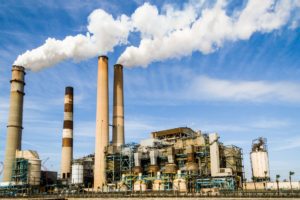
HARRISBURG, PA (November 22, 2023) On November 21, Governor Shapiro announced his decision to appeal the November 1 Commonwealth Court decision that declared the Regional Greenhouse Gas Initiative (RGGI) to be unconstitutional.
RGGI is a program established in 2005 that requires regulated power plants to acquire allowances for the carbon emissions they produce. Within the currently-participating states, RGGI reduces emissions from fossil fuel power plants and funds climate change initiatives with the collected fees. Proceeds from the program in Pennsylvania would go to the state’s Clean Air Fund, which can then be put towards efforts that reduce air pollution. By not implementing RGGI, Pennsylvania has already missed out on over $1 billion dollars in RGGI proceeds since January 2022 that would have gone towards air pollution reduction programs.
Executive Director and Chief Counsel, Joseph Otis Minott, Esq. issued the following statement:
“As the nation’s fourth largest emitter of carbon dioxide, Pennsylvania needs RGGI, an effective cap-and-invest program, to advance a commonsense energy plan that cuts climate pollution and ensures an equitable energy transition and the jobs that come with it. The Governor’s appeal gives us a crucial chance to participate in this program and secure a clean energy economy for Pennsylvania. The Governor’s diverse RGGI stakeholder group reached the consensus that such a cap and trade program for the power sector would be critical for generating the funds needed to support the state’s clean energy transition. RGGI is the clear choice for meeting the working group’s goals and Governor Shapiro’s criteria of supporting climate action, clean energy job creation, public health protection, and energy affordability.”

HARRISBURG, PA (November 2, 2023) – In 2020, the recommendations of Pennsylvania’s 43rd Statewide Investigating Grand Jury released a report on the systemic problems of the unconventional oil and gas industry. The Grand Jury made a series of reasonable and easy-to-implement recommendations that would better protect the health, welfare and quality of life of Pennsylvanian residents. Despite the recommendations of the Grand Jury, the Pennsylvania Legislature has done little to implement the Grand Jury recommendations.
Today, Governor Shapiro is moving forward in implementing the Grand Jury Recommendations by instructing Pennsylvania’s Department of Environmental Protection (DEP) to draft regulations to protect Pennsylvania residents and the environment from the chronic pollution emitted by the gas industry.. In today’s press event with CNX Resources, the Governor will highlight new public health and environmental protections from the gas industry. Residents throughout Pennsylvania have been demanding protections from gas infrastructure for years while the gas industry has opposed them.
The Governor has instructed the DEP to adopt regulations that will require the gas industry to disclose all the chemicals used in drilling, set stronger standards for dealing with drilling waste and assure the safety of gathering pipelines. Governor Shapiro also committed to improved standards to reduce climate-changing methane emissions from the gas industry which is a major contributor to climate change.
In Response, Joseph Otis Minott, Esq., Clean Air Council Executive Director and Chief Counsel, released the following statement:
“Clean Air Council strongly supports Governor Shapiro’s decision to move forward in implementing the commonsense public health and environmental standards recommended by the 2020 Grand Jury to better protect Pennsylvania residents from oil and gas operations. For far too long, the gas industry and too many elected leaders have shown a disregard for the harm the industry is causing to residents’ health and the environment. It is past time that our leaders adopt protections from this industry.”
“We applaud Governor Shapiro’s leadership in recognizing the need to further reduce methane pollution from the gas industry, and look forward to supporting him and the DEP in tailoring the forthcoming federal rules to ensure they address the concerns of Pennsylvania residents affected by the gas industry.”
The Council encourages the Governor to additionally propose regulations to require setbacks that better protect residents and our natural resources from harmful gas infrastructure. DEP has the legal authority, scientific evidence, and public support needed right now to adopt setback distances that prevent this infrastructure from being built too close to our homes, schools, hospitals, streams, and wetlands.
To demonstrate how the industry needs to do more, the Governor announced a partnership with the gas company CNX Resources, which agreed to disclose its chemical use and better monitor its emissions, something that residents in areas affected by fracking have been demanding for years.
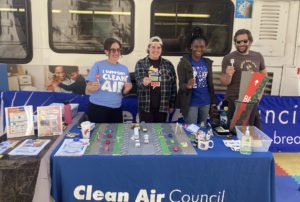
Car centric road design requires a tremendous amount of parking, but what if this public space was used for something else? Each year in cities across the world, people come together to reimagine street parking into safe and inviting pedestrian spaces. The Council and its pedestrian advocacy group Feet First Philly are long time participants in this international celebration, and this year the Council’s team turned a parking space on the 1800 block of Chestnut St. into a temporary parklet where people walking by could try their hand at redesigning a city street with an interactive game. Check out these photos from our parklet in Center City, Philadelphia.

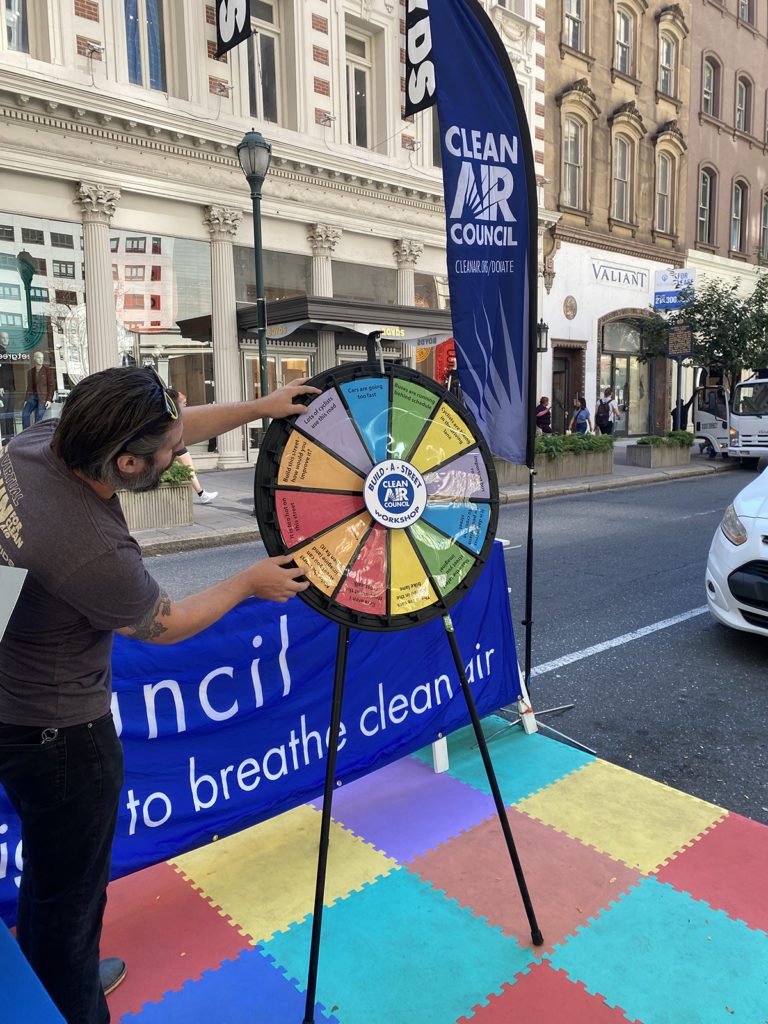
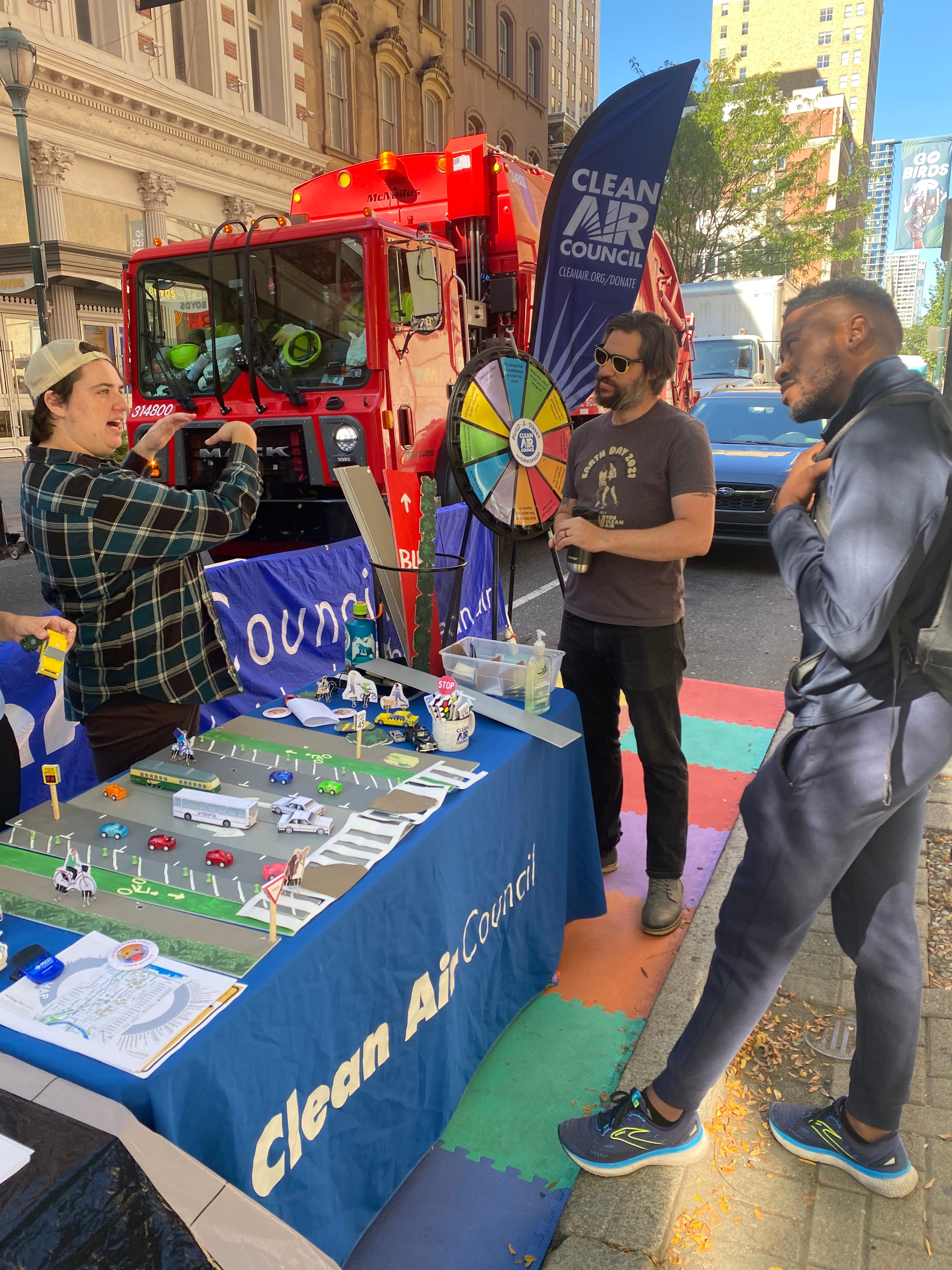

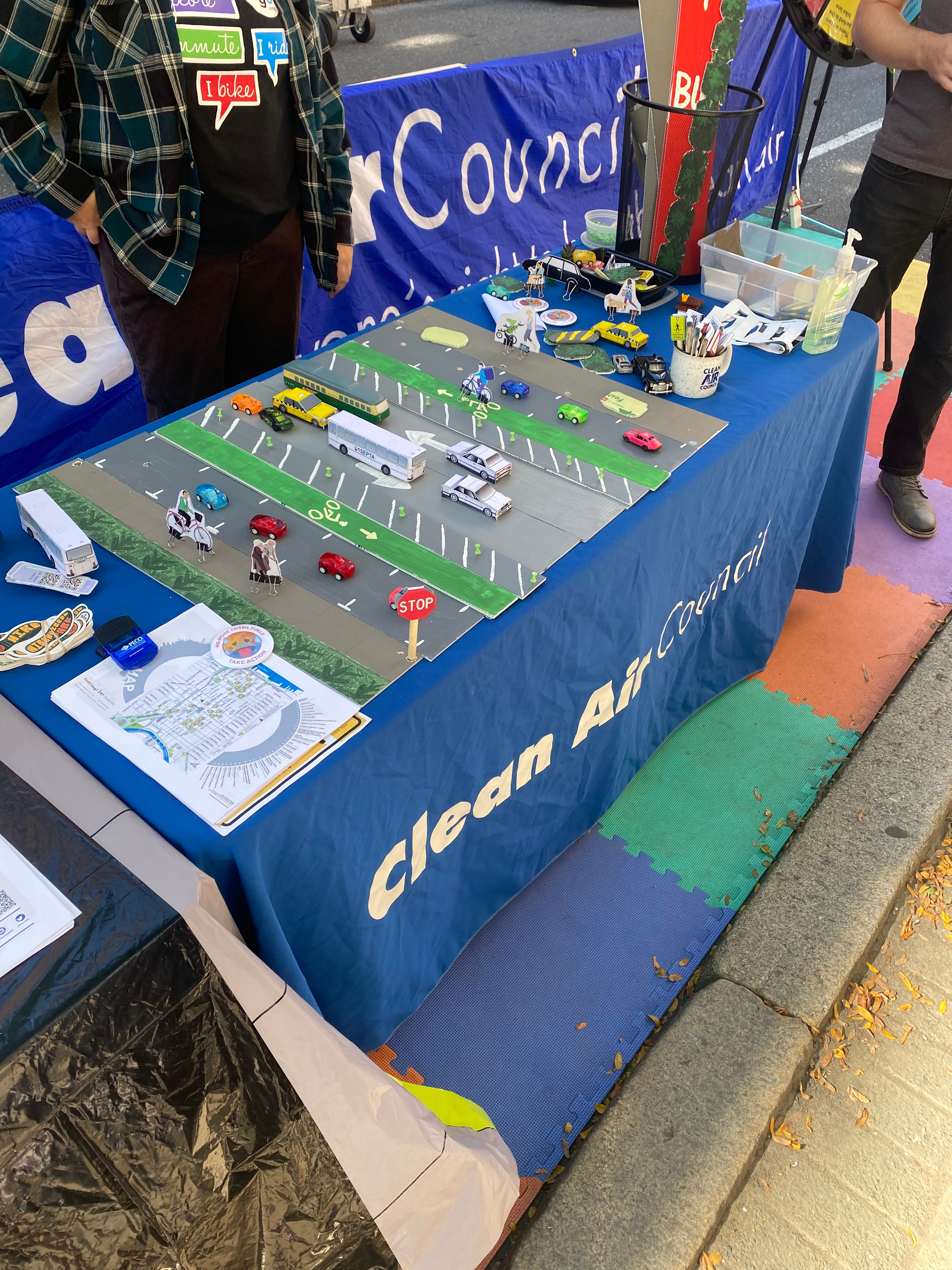
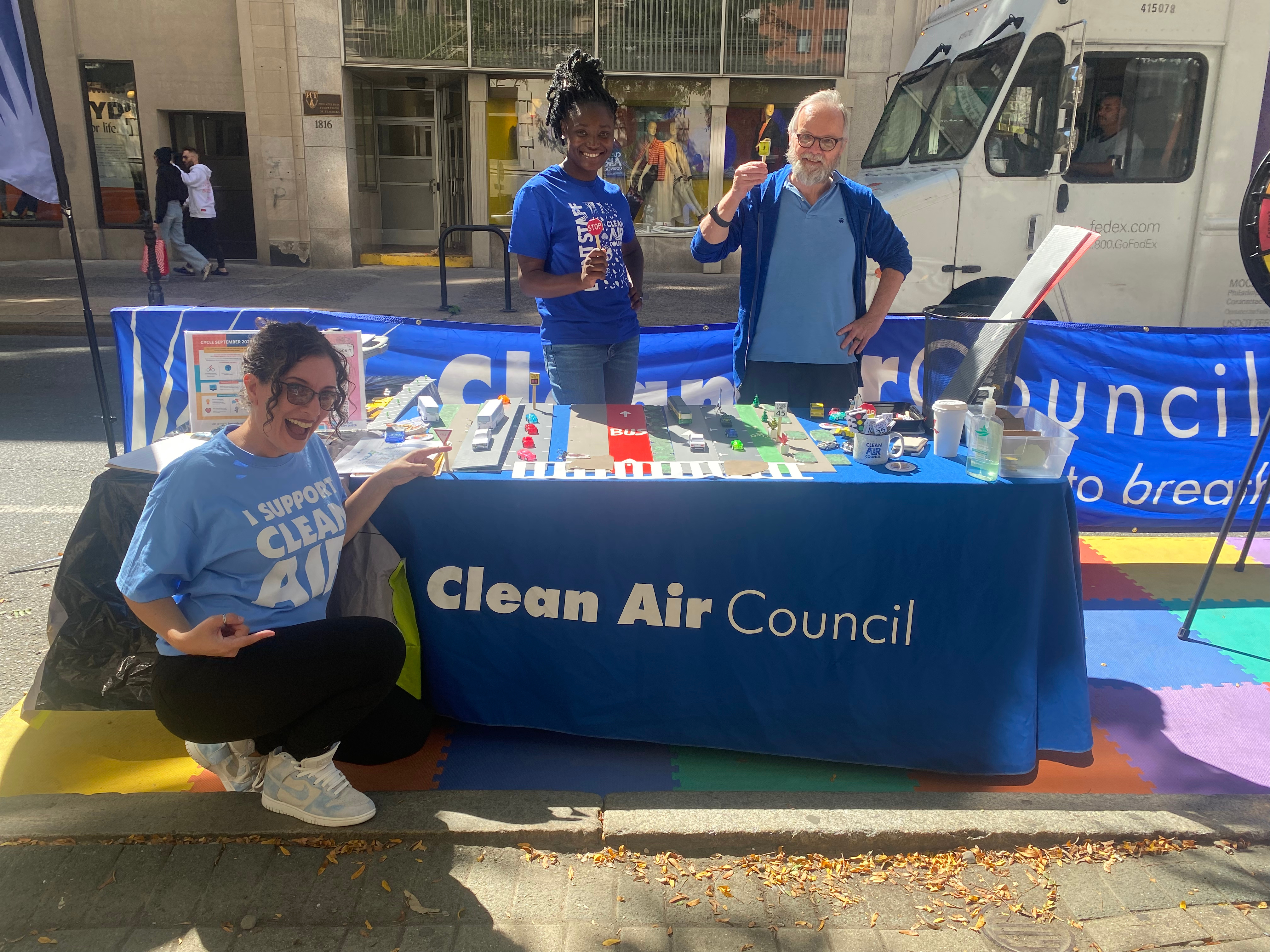
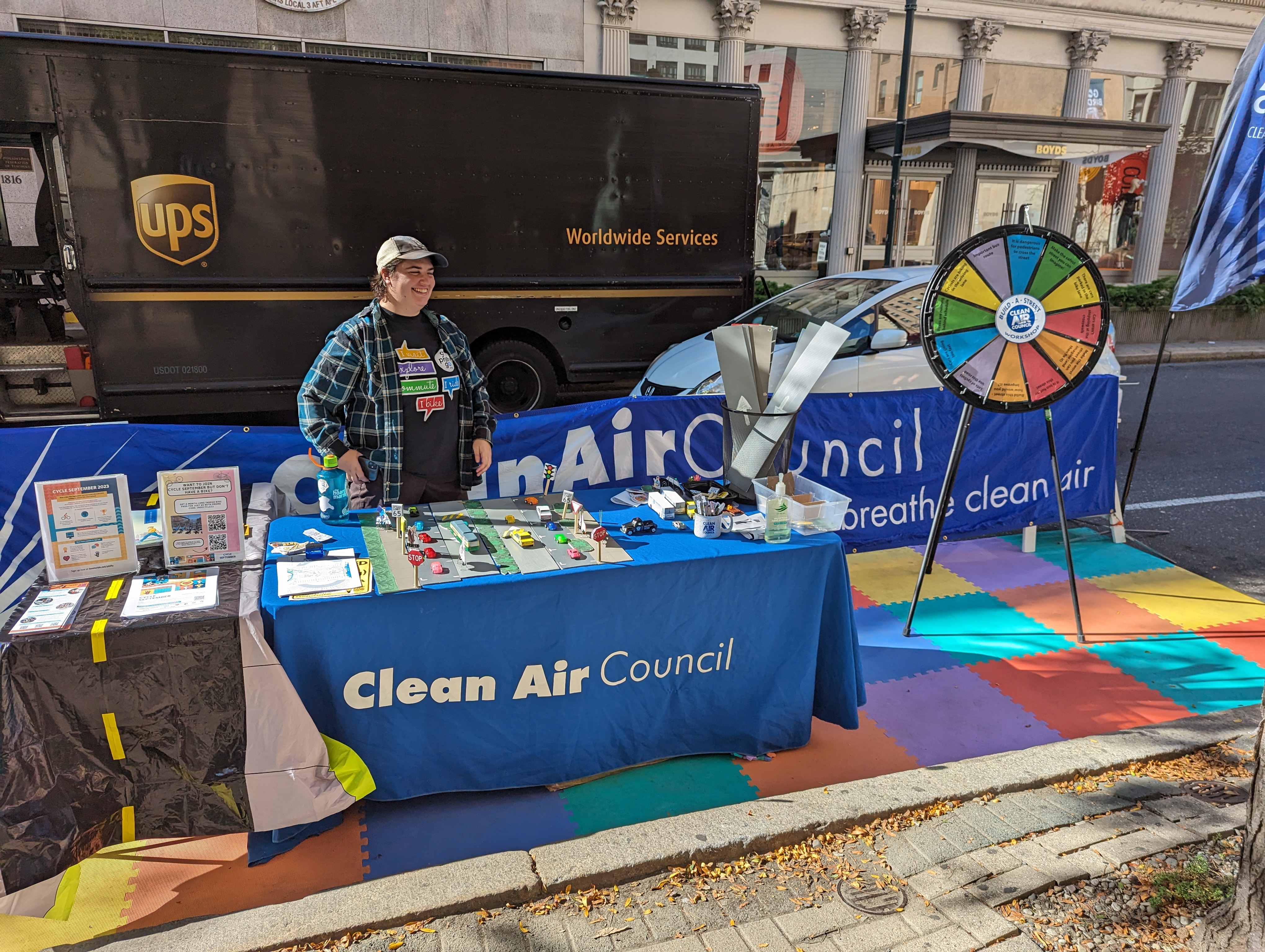
Learn how you can get a permanent parklet in your Philly neighborhood with this Feet First Philly Infographic, or contact Titania Markland, Transportation Outreach Coordinator to learn more about parklets and PARK(ing) Day at tmarkland@cleanair.org.

Reductions in cross-state smog-forming emissions will go forward
Environmental and health groups celebrated an important step toward clean air after a federal appeals court today denied the requests of states and industry groups to block the Environmental Protection Agency’s (EPA) “Good Neighbor Rule.” The rule, designed to address cross-state air pollution and the adverse health effects of ozone pollution, also called smog, will improve public health and air quality.
The Good Neighbor Rule, a vital measure aimed at reducing cross-state air pollution, requires coal-burning power plants and other high-polluting industrial sources to decrease emissions that contribute to smog. Polluters in upwind states like Indiana and Ohio that had previously avoided implementing pollution controls are slated to reduce their contributions to hazardous smog levels in downwind states like Connecticut and Wisconsin.
“The court’s refusal to block this protective air rule serves as a critical step towards holding upwind polluters accountable for their contribution to cross-state smog,” said the coalition of health and environmental groups defending the rule. “We remain committed to fighting for cleaner air and a healthier future, ensuring that polluters are held responsible for jeopardizing air quality.”
The federal appeals court’s decision to reject the stay request is a triumph for communities striving to combat the health risks posed by air pollution. EPA estimates that the Good Neighbor Rule, when fully implemented, will prevent more than a million asthma attacks annually and at least a thousand premature deaths. This rule will also improve the health of forests and waterbodies harmed by ozone and its precursor pollutants.
“This court decision marks a crucial step in our ongoing battle to hold upwind polluters accountable for exacerbating cross-state smog pollution,” said Earthjustice Attorney Kathleen Riley. “With more than 127 million people residing in regions plagued by harmful ozone levels, the Good Neighbor Rule protects public health. Earthjustice will keep fighting to ensure that this and national air quality rules truly protect public health.”
The U.S. Court of Appeals decision for the D.C. Circuit is notable after other courts blocked a related rule from going forward in certain states. With support from the coalition of environmental and health organizations, EPA has consistently argued that all challenges to these national protections should be heard in the D.C. Circuit, the court with experience reviewing prior Good Neighbor rules.
Smog, a harmful form of air pollution generated by vehicles, factories, and power plants, leads to asthma attacks, heart and lung diseases, and premature deaths nationwide.
The Good Neighbor Rule is just one necessary step to protect people from the adverse health impacts of air pollution. Recent studies show that the national standards for particulate matter—soot—and smog- are far too weak to protect people from premature death, lung cancer, reproductive harm, and cardiovascular disease. This year, the EPA proposed a new standard for soot, but it’s not nearly as strong as scientists and doctors say it needs to be. Stronger soot and smog regulations would save tens of thousands of lives.
A coalition of environmental and health groups has defended the Good Neighbor Rule in court. The coalition includes the Environmental Defense Fund; Citizens for Pennsylvania’s Future, Clean Air Council, and Clean Wisconsin represented by the Clean Air Task Force; and Air Alliance Houston, Appalachian Mountain Club, Center for Biological Diversity, Chesapeake Bay Foundation, Downwinders at Risk, Louisiana Environmental Action Network, Sierra Club, Southern Utah Wilderness Alliance, and Utah Physicians for a Healthy Environment, represented by Earthjustice.

